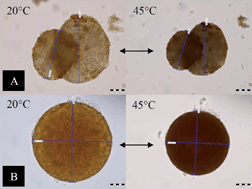Thermo-responsive adhesion properties of composite hydrogel microcapsules
Abstract
The present work describes the synthesis and characterisation of thermo-responsive microcapsules consisting of poly-N-isopropylacrylamide (PNIPAM) hydrogel, hydrophilic


 Please wait while we load your content...
Please wait while we load your content...